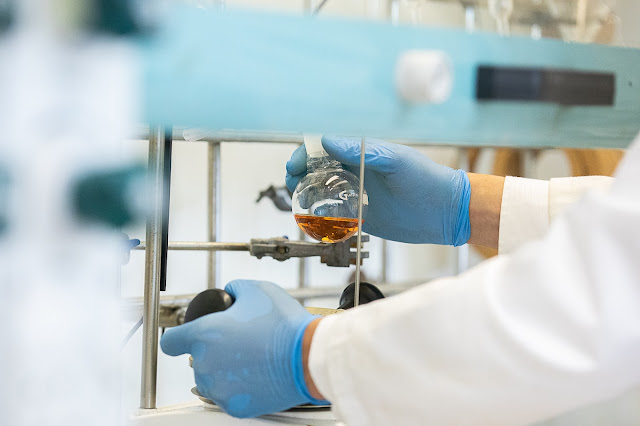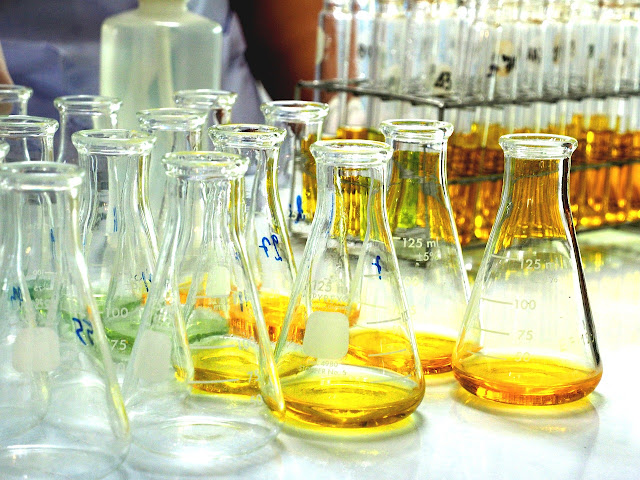What are LearnSci prelab simulations?
"Targeted prelab preparation helps is an essential component of a laboratory course, to prepare students and reduce the cognitive load in the lab" (Agustian and Seery, 2017).
Our undergraduate chemistry laboratory course uses online simulations to help students prepare for unfamiliar techniques and skills they will meet in their practical work.
How do prelab simulations work?
Learning Science LabSims simulate common skills and techniques in laboratory work, for example weighing a solid, setting up a reaction in a refluxing solvent, or running an analytical sample. There is even one covering dressing for the lab. Each simulation has several variables representing right and wrong procedure in an activity.
Doing the wrong thing in the lab would result in (sometimes dangerous) failure. This is modelled by the simulation with students receiving feedback directing them to issues and enabling them to be corrected. This allows students to familiarise themselves with techniques and to make and correct mistakes in a zero-stakes environment.
In our lab, a small number (2-4) simulations are selected as necessary preparation for each experiment. Learning Science package these together into “assessments” that can be set up as LTI linked quizzes on Blackboard. Repetition of simulations is kept to a minimum with each done a maximum of twice by students in one year (usually once early in Semester 1 and then again in Semester 2).
What is the impact on students?
Access statistics for 2022-23 show that students are making good use of the LabSims. A total of 1321 LabSims were completed by students for the Level 2 lab. Some students complete each LabSim once, whereas others revisit them two, three, or more times. Some students like to repeat the whole Assessment whereas others revisit individual LabSims as needed.
Although most repeats are done within hours of the first attempt, some students will revisit the LabSim days, weeks or even months later. The positive impact on students is summed up in the following comment which also alludes to the LabSims beneficial impact on inclusivity.
"[LabSims are] very good in learning how to do the more difficult and unfamiliar parts of a practical. As someone who isn’t great at following written instructions I find it very helpful to be able to simulate the process to make it easier to learn. It's saved me lots of time in practical sessions as I already know/understand what I am doing"
Students demonstrate continued engagement with LabSims, throughout the year, despite this not being an assessed activity. This strongly suggests students find them useful in preparing for the lab and confirms evaluation data in which 82% of respondents agreed that the LabSims helped them understand the reasoning behind the practical steps and work safely in the lab.
Additionally, one student said “LabSims can be very helpful for reducing stress in the lab as they prepare you for the practical aspects”. Research evidence has shown prelabs can reduce lab-related anxiety (George-Williams et al, 2022). Evaluation data confirmed that the LabSims helped my students feel less anxious about doing practical science (73% agree & strongly agree) and helped them engage in the practical elements of the course.
References
Agustian, Hendra, Y. and Seery, Michael K. (2017). Reasserting the role of pre-laboratory activities in chemistry education: a proposed framework for their design. Chemistry Education Research and Practice, vol 18, pp518-532 George-Williams, Stephen R.; Blackburn, Richard A. R.; Wilkinson, Shane M. and Williams, Dylan P. (2022). Prelaboratory Technique-Based Simulations: Exploring Student Perceptions of Their Impact on In-Class Ability, Preparedness, and Emotional State. Journal of Chemical Education, vol 99 (3), pp1383-1391 Learning Science Ltd. LabSims, https://www.learnsci.com/

